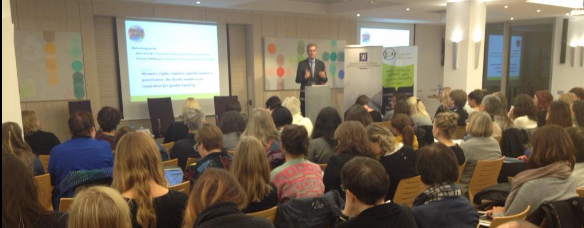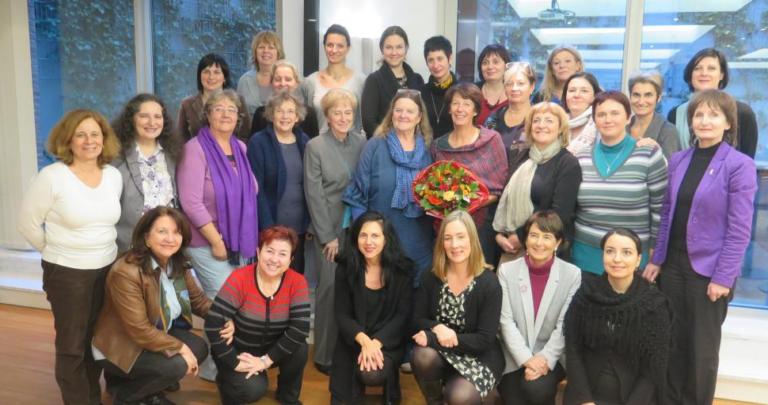[Brussels, 12 December 2011] According to new research from two UK universities, the language used in men’s magazines, far from being harmless or ironic fun, could be legitimising hostile sexist attitudes.
Psychologists from Middlesex University and the University of Surrey found that when presented with descriptions of women taken from lads’ mags, and comments about women made by convicted rapists, most people who took part in the study could not distinguish the source of the quotes.
The research due to be published in the British Journal of Psychology also revealed that most men who took part in the study identified themselves more with the language expressed by the convicted rapists.
Psychologists presented men between the ages of 18 and 46 with a range of statements taken from magazines and from convicted rapists in the study, and gave the men different information about the source of the quotes. Men identified more with the comments made by rapists more than the quotes made in lads’ mags, but men identified more with quotes said to have been drawn from lads’ mags more than those said to have been comments by convicted rapists.
The researchers also asked a separate group of women and men aged between 19 and 30 to rank the quotes on how derogatory they were, and to try to identify the source of the quotes. Men and women rated the quotes from lads’ mags as somewhat more derogatory, and could categorize the quotes by source little better than chance.
Dr Miranda Horvath and Dr Peter Hegarty argue that the findings are consistent with the possibility that lads’ mags normalise hostile sexism, by making it seem more acceptable when its source is a popular magazine.
Dr Horvath, lead researcher from Middlesex University, said: “We were surprised that participants identified more with the rapists’ quotes, and we are concerned that the legitimisation strategies that rapists deploy when they talk about women are more familiar to these young men than we had anticipated.”
Due to concerns about their content, from February this year many major supermarket chains and petrol stations in the United Kingdom agreed to place lads’ mags on the top shelf, out of the eye line of children and some have installed modesty boards to hide front cover images.
But the measures to protect children do not address the concerns born out by the findings of the research and Miranda Horvath, is concerned that lads’ magazine editors are not working hard enough to moderate the content of their magazines: “A lot of debate around the regulation of lads’ mags has been to do with how they affect children but less has been said about the influence they have on their intended audience of young men and the women with whom those men socialise.”
“These magazines support the legitimisation of sexist attitudes and behaviours and need to be more responsible about their portrayal of women, both in words and images. They give the appearance that sexism is acceptable and normal – when really it should be rejected and challenged. Rapists try to justify their actions, suggesting that women lead men on, or want sex even when they say no, and there is clearly something wrong when people feel the sort of language used in a lads’ mag could have come from a convicted rapist.”
Dr Peter Hegarty, of the University of Surrey’s Psychology Department, added: “There is a fundamental concern that the content of such magazines normalises the treatment of women as sexual objects. We are not killjoys or prudes who think that there should be no sexual information and media for young people. But are teenage boys and young men best prepared for fulfilling love and sex when they normalise views about women that are disturbingly close to those mirrored in the language of sexual offenders?”
He added that young men should be given credible sex education and not have to rely on lads’ mags as a source of information as they grow up.
Anna van Heeswijk, Campaigns Manager for OBJECT, a human rights campaign group which campaigns against the objectification of women, said: “This crucial and chilling piece of research lays bare the hateful messages which seep out of lads’ mags and indoctrinate young men’s attitudes towards women and girls. When the content of magazines aimed at teenage boys mirrors the attitudes of convicted rapists, alarm bells must ring.
“If we are serious about wanting an end to discrimination and violence against women and girls, we must tackle the associated attitudes and behaviours. This means tackling the publications which peddle them. The Leveson Inquiry is currently looking into the culture and ethics of the press. These disturbing findings unequivocally demonstrate the need for the portrayal of women to be included in the remit of this inquiry. Now is the time for action.”


